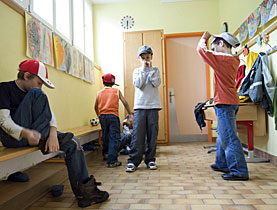Expert says laws alone won’t solve mobile porn

The Swiss House of Representatives has approved, by a two-to-one margin, motions to ban pornography and violent content from being distributed on mobile phones.
Following Thursday’s vote the government may have to draft a new law to address the issue. But child psychologist Daniel Süss tells swissinfo that legislation alone is not the best way to deal with the porn problem, particularly in how it relates to youth.
Much of the material consumed by many young adults is no longer limited to hardcore pornography and violence but also includes racism, bullying and scenes of executions and bestiality.
What today’s youngsters are doing, Süss explains, is simply a more high-tech form of exploring and rebelling –something that previous generations are equally guilty of.
swissinfo: Could legislation stop young people from viewing or producing explicit content?
Daniel Süss.: It will have an effect on parents and teachers. I think they will watch that young people don’t get into problems and they will establish rules and regulations. But this will have the effect that it [viewing and producing content] takes place in areas that adults cannot control that easily. So it’s maybe not in the school anymore, but outside, where young adults share content.
The other aspect is that if things are forbidden, then they are even more attractive as a means to provoke or to get status in the peer group. If you have forbidden content, you may be a hero in the peer group.
swissinfo: Are politicians addressing the issue the correct way?
D.S.: For violence, we have Article 135, which could be applied to violent content on mobile phones but the question is whether this just leads to the criminalisation of youth behaviour and if it really helps. Or should the approach be to work with young people on the subject of media competency and to work on violence and sexual sensitisation?
I think this would be more important. If you compare with other countries – for example Germany, with another form of this regulation – it does not lead to different behaviour among young people.
swissinfo: Will a top-down approach address the root causes?
D.S.: I think for young people, mainly if they share pornographic content, it’s one aspect of curiosity, of their sexual development and it’s to impress their peers with the content, for example, with sexual content with animals. Thirty per cent of the young people who had seen inappropriate content on a mobile phone reported viewing this kind of content.
But I would interpret this as an opportunity to shock or impress peers and not because they think this is especially attractive.
swissinfo: This type of content has been described as harmless in some instances and as more serious in others. What are teenagers producing themselves?
D.S.: First of all, it is important to know that most of the content that teenagers share is downloaded or received from other sources, but not produced by themselves. In a study, nine per cent of teenagers told us that they produced things [content] themselves. It’s mostly this happy slapping or some sexual interactions, but it is not very common.
swissinfo: Did previous generations do relatively comparable things with the technology they had – or would they have had with today’s technology?
D.S.: If you look at this from a developmental psychology point of view, young people try to cross borders and they try to provoke adults or create their own world and their own lifestyle and values.
In this context, they always took risks. For example, it was common to go to cinemas or to rent movies with pornographic content or violence, but we didn’t have the possibility of mobile phones to produce and share content as easily like today.
swissinfo: Given our inquisitive nature, does a ban on pornography and violence on mobile phones actually make sense?
D.S.: I think it’s not right to criminalise the young people – the users of the content – but to regulate internet providers. This is important, that forbidden content like hardcore pornography and violence is regulated, but it’s not sensible to criminalise the young users of this content.
swissinfo-interview: Justin Häne
Almost one in two secondary school students in Switzerland have watched porn or violence on their mobile phones, according to a Zurich University Study.
It indicated that 56 per cent of young males have consumed violence or porn on the small screen once or several times and 8 per cent do so regularly.
The research, conducted under the supervision of Dr Süss, was carried out with the participation of 435 German-speaking students between the ages of 12 and 16.
On Thursday, Swiss politicians called on the government to ban the distribution of inappropriate content on mobile phones.
They said a general ban – not just for teens – was necessary since it would be difficult to determine who would be eligible and who not eligible to download porn or violence.
The House of Representatives voted in favour of the plan despite the government’s recommendation to reject the motions.
Telecommunications providers are already obliged to block access to pornography for youth.
Phone networks are increasingly allowing for higher data transmission speeds and capacities.
As mobile phones and smartphones rival the functionality of computers, it may be difficult to filter content depending on how it is distributed.
Service providers can block certain websites but it would be more difficult to block content distributed through technology known as Bit Torrent without banning torrent files all together.
Torrents do not transfer entire files directly but scramble them into random bits which are then reassembled on the receiver’s computer.

In compliance with the JTI standards
More: SWI swissinfo.ch certified by the Journalism Trust Initiative











You can find an overview of ongoing debates with our journalists here . Please join us!
If you want to start a conversation about a topic raised in this article or want to report factual errors, email us at english@swissinfo.ch.